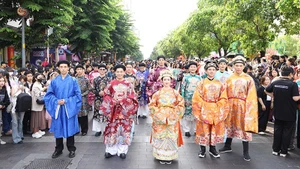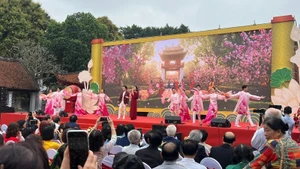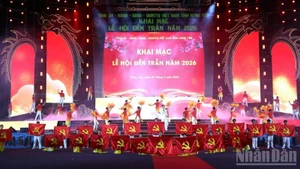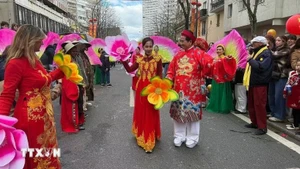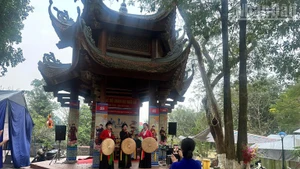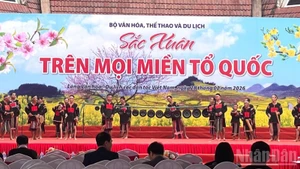Marking the 55th anniversary of the Viet Nam Film Festival (1970–2025), this year’s event is expected to lay the foundation for the strong development of Viet Nam’s cinema industry in the coming period.
Outstanding highlights
The 24th Viet Nam Film Festival brings together 144 films across various genres, reflecting filmmakers’ efforts to innovate in both themes and storytelling. Based on criteria that emphasise contemporary relevance, rich cultural identity, direction, and comprehensive, sustainable, integrative development, the selection committee chose 87 official entries (including 16 feature films, 36 documentaries, 14 science films and 21 animated films) to officially compete at the festival.
Notably, 11 out of 16 competing feature films have surpassed 100 billion VND in revenue, especially “Red Rain” film with over 700 billion VND. This year’s festival marks a strong comeback for State-produced films, particularly the revolutionary war genre, with standout works such as “Red Rain”, “The Tunnel: Sun in the Dark”, and “Airborne Battle”.
Ta Quang Dong, Deputy Minister of Culture, Sports and Tourism, assessed that over the two years since the 23rd Film Festival (2023), Vietnamese cinema has shown vitality: the number and quality of films have increased, the cinema market has become more dynamic, Vietnamese films have been well received at international festivals, and a confident, creative new generation of filmmakers has emerged. Many films have become cultural ambassadors, contributing to promoting the image of the country, people, and cultural identity of Viet Nam to international friends. In addition to maintaining regular awards, a new feature of the 24th Viet Nam Film Festival is the presentation of Certificates of Merit by the Minister of Culture, Sports and Tourism to individuals and collectives with special contributions to cinema.
A major attraction of this year’s festival is the Panorama programme, featuring non-competition films produced over the past two years, showcasing a wide range of genres, styles, and themes.
Cinema lovers in Ho Chi Minh City can also immerse themselves in festival activities such as the photo exhibition “Ho Chi Minh City rising with the nation through a cinematic perspective”; the “Music in film” programme on Nguyen Hue Pedestrian Street; as well as experiences, tours, and activities highlighting the beauty of the city. On this occasion, Ho Chi Minh City proudly received the title “Global Creative City of Cinema” of UNESCO.
At the same time, thematic workshops and discussions within the framework of the festival provide a forum for artists, film managers, producers, distributors, and exhibitors to exchange experiences and promote the development of the industry. Director Charlie Nguyen expressed optimism: the 24th Viet Nam Film Festival offers timely momentum, reaffirming the fact: Viet Nam has an audience, a market, internal strength, and State support to transform its cinema into a true cultural industry.
Prospects for development
Since its establishment in 1970, the Viet Nam Film Festival has honoured outstanding cinematic works and reflected the evolution of the national cinema industry, from the resistant war period to the period of renovation and international integration.
Through each film festival, many cinematic talents have been discovered and honoured. Their continuous creativity and dedication have built a strong foundation for Vietnamese cinema. The Golden Lotus Awards, given to the most excellent works and individuals at each festival, have become a national cinematic pride.
Not only making their mark domestically, many Vietnamese cinema works have entered the world arena and won prestigious awards, affirming their position in the region and the world. Typical examples include the film “Wild Fields” (directed by Nguyen Hong Sen, 1979), which won the Golden Lotus Award at the Viet Nam Film Festival in 1980 and the Gold Medal at the Moscow International Film Festival in 1981.
“When the Tenth Month Comes” film (directed by Dang Nhat Minh, 1984) won the Golden Lotus Award at the Viet Nam Film Festival in 1985, the Special Award at the Asia-Pacific Film Festival (1989), and a certificate of merit from the Peace Protection Committee at the Moscow International Film Festival (1985).
“Sand Life” film (directed by Nguyen Thanh Van, 1999) received the Golden Lotus Award at the Viet Nam Film Festival in 2001, the Special Award at the Amiens Film Festival in 2000, and the Best Film at the Asia-Pacific Film Festival in 2000.
Recently, “Glorious Ashes” film (director Bui Thac Chuyen, 2022) won the Golden Lotus Award at the Viet Nam Film Festival in 2023, and won the Golden Balloon Award (Montgolfière D’or) at the Three Continents Film Festival, held in Nantes (France).
The documentary film “The Children in the Mist” (director Ha Le Diem, 2021) won the Golden Lotus Award at the Viet Nam Film Festival in 2023, Best International Film at the Docaviv Film Festival, and Best Director at the Amsterdam International Documentary Film Festival.
Building on earlier achievements, the 24th Viet Nam Film Festival, with its large-scale event series and diverse cultural space, reaffirms its prestige as a national cinematic brand.
“This is not only a venue to honour creativity but also a bridge for the Vietnamese cinema to more deeply integrate, meeting audience needs and fostering sustainable development,” emphasised Dang Tran Cuong, Head of the Cinema Department.
However, it is also necessary to recognise that building a cinema industry in the new era requires open mechanisms and policies, strategic investment resources, stronger public–private cooperation, high-quality human resource development, expanded international cooperation, and robust application of science and technology in film production and distribution.
For Viet Nam to develop a cinema industry sustainably and integrate into world cinematic trends, it needs state support for projects with unique voices, market expansion potential and high investment risk. Without such support, venturing into the global market will continue to rely solely on the efforts of a few capable enterprises or individuals,” recommended Producer Trinh Hoan, a representing HK Film.
Overcoming current obstacles, the Vietnamese cinema will uphold fully its role as a leading sector of the cultural industry that embodies national identity while possessing the power to spread and assert its position on the international stage.



